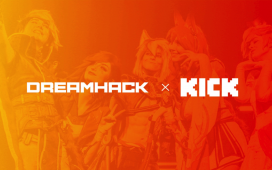
Pictured: Jake Sin, PUBG Corporation’s director of central esports. Credit: PUBG Corp.
Mentioned in this article
From August 9-11, PUBG Corporation ![]() will host its first-ever global competition for battle royale shooter PLAYERUNKNOWN’S BATTLEGROUNDS
will host its first-ever global competition for battle royale shooter PLAYERUNKNOWN’S BATTLEGROUNDS ![]() , the PUBG Nations Cup. Taking place at the Jangchung Arena in Seoul, South Korea, the $500K USD event will feature national teams from 16 countries across five continents, offering a different kind of large-scale PUBG competition than we’ve seen from the publisher in the past.
, the PUBG Nations Cup. Taking place at the Jangchung Arena in Seoul, South Korea, the $500K USD event will feature national teams from 16 countries across five continents, offering a different kind of large-scale PUBG competition than we’ve seen from the publisher in the past.
“This is a unique attempt for PUBG esports because it will be our first time that we’re hosting an event that brings together national teams—teams that are representing their nations as opposed to club teams or typical esports organizations that are competing in regional tournaments and leagues,” said Jake Sin, PUBG Corporation’s director of central esports, in an interview with The Esports Observer. “That alone will create a very unique and compelling narrative for a broader audience to follow and get excited about.”
With teams from countries such as the United States, China, Germany, Japan, and the United Kingdom, the PUBG Nations Cup could reach beyond the core esports audience, and potentially hook people who might not know teams like Cloud9 ![]() or Gen.G. Esports
or Gen.G. Esports ![]() .
.
“How do you narrate the story of 16 teams that are competing all at the same time, all over the place over a vast size of a map? “
“By imbuing a national identity to each of these teams, we’re able to reach out to a broader audience—because obviously, the common denominator that everyone shares is their national identity,” said Sin. “By tapping into that fandom that is almost organically already there, we’re able to make this event appealing to a lot greater audience than for example an event that consists of typical esports orgs.”
The Nations Cup is the first global event that PUBG Corporation is throwing during the 2019 season, after establishing leagues and tournaments across nine regions and awarding millions of dollars in prizing to date. It’s also something of a warm-up ahead of the PUBG Global Championship, which will be held in November in a yet-unannounced location.
Credit: PUBG Corp.
“This event is our first PUBG-hosted event of the year,” he said, “and basically from learning about the event operation and even production and broadcast, there will be a lot of learnings from having this event that will carry over to our Global Championship in November 2019.”
Refining the Royale
By its very nature, the battle royale genre brings unique challenges of scale. PUBG matches can have as many as 100 players competing to be the last player or squad standing on an enormous map, and even with the scaled down esports format with 16 teams of four players each, that’s still 64 players to follow and highlight during a single match.
“By making an event that relies on national identities of teams to compete, we’re able to make that happen very naturally.”
“How do you narrate the story of 16 teams that are competing all at the same time, all over the place over a vast size of a map? How do you make that consumable for the viewer? How do you make that storyline exciting? How do you make the storytelling consistent and coherent?” said Sin. “That’s probably the biggest challenge that there is, and one of the ways we’re tackling that challenge—or opportunity, if I’m being optimistic—is that we’re basically trying to create a broadcast that is very diverse and that is very specific to a certain segment of the fans, or certain fan bases.”
That’s another way in which the country-based format of the PUBG Nations Cup could organically benefit the storytelling process. It allows Sin’s team to hone in on specific countries for focused streams, rather than try to create one broadcast that covers everything for every single viewer.
“By making an event that relies on national identities of teams to compete, we’re able to make that happen very naturally,” he said. “We can create, for example, a Korean broadcast that focuses around the Korean team, or a Chinese broadcast that focuses on the Chinese team. Storytelling the perspective of that team is how we plan on creating unique and compelling content that everyone has an easy time following and being excited about.”
Credit: PUBG Corp.
Related Article: PUBG Corp. EMEA Esports Operations Manager on Battle Royale Challenges: ‘It’s Uncharted Territory’
According to Sin, figuring out how to turn PUBG into a compelling esport to both play and watch began within the game itself, which had to be heavily tweaked to meet various competitive needs.
“We realized very quickly that our game, as it was, wasn’t a very exciting type of game to watch as an esport,” said Sin. “It’s obviously been very fantastic as streaming content, but in esports, all teams have to compete professionally and at a very high level. The amount of camping that took place, and the amount of farming that had to be done before any kind of meaningful fight took place was painfully long—that was overemphasized, and that wasn’t really getting us far in terms of getting viewers excited about our esports.”
“We are building for longevity, and I think we are setting our teams up for success, and also stability and sustainability.”
By altering various parameters of the game and minimizing the randomness of some play elements, Sin said that PUBG‘s early-game elements happen much more quickly than before and that fights begin much sooner, as well. “We feel that now we’ve landed on a pretty good place where the pros are mostly content about the randomness vs the skill balance, and the pace of the game in general,” he added.
The Future of PUBG Esports
According to Sin, his team’s biggest success so far this season is establishing all of the regional leagues and tournaments that ultimately feed into the global competitions and narrative, creating what PUBG Corporation hopes will be a sustainable model for years to come. The 2020 schedule is expected to look very similar to 2019’s, giving organizations a clear sense of what to expect so that they can plan and invest for the long run.
“We are building for longevity, and I think we are setting our teams up for success, and also stability and sustainability,” he said. “The way we’re able to do that is to create a predictable and transparent structure and calendar of events that will be repeated season after season. That allows orgs to make serious investments and really have an understanding of what they’re signing up for.”
Credit: PUBG Corp.
Building a global structure of this scale requires significant investment from all involved parties, starting with PUBG Corporation at the top. Putting a focus on longevity potentially means sacrificing short-term profitability in favor of hopefully creating something that lasts and provides a longer-term return-on-investment. Sin believes that PUBG Corporation’s considerable investment now, along with the investment and participation of teams and tournament organizers, will ultimately yield beneficial results for everyone.
We focus on content and we focus on putting on great events that the fans are excited about.”
“It’s an expensive structure to sustain. Because it is the beginning stages of the growth of our ecosystem, there has to be a lot of injection from the publisher-side, the PUBG side, to make this stay afloat, and make things happen at a very high-quality level,” said Sin. “I think eventually, on the commercial front, there will be lots of improvement in that area—great strides in that area—to make sure that everybody involved in this ecosystem will be sustainable. And that’s not just for PUBG as a publisher, but also for the teams and players. We do want every participant of this ecosystem to come out as the winner, and by increasing the size of the pie with initial heavy investments from the PUBG side and the publisher side, I think one day we will be able to get there—and there will be a great enough pie for everybody to get a piece of and be content with.”
For Sin, the goal right now is simply to focus on the product: develop events and content that players are truly engaged by and want to continue following. If PUBG Corporation can nail that part, then he believes that financial sustainability will gradually follow in time.
“That’s where I think we’re headed, and I think to get there, we don’t focus on money at first. We focus on content and we focus on putting on great events that the fans are excited about,” he said. “I think that’s really the only way we’ll ever make it—not focusing on sponsorships or media rights sales, or anything like that. At first, especially, we need to make great content, and we’re very, very hyper-focused on that right now.”

















